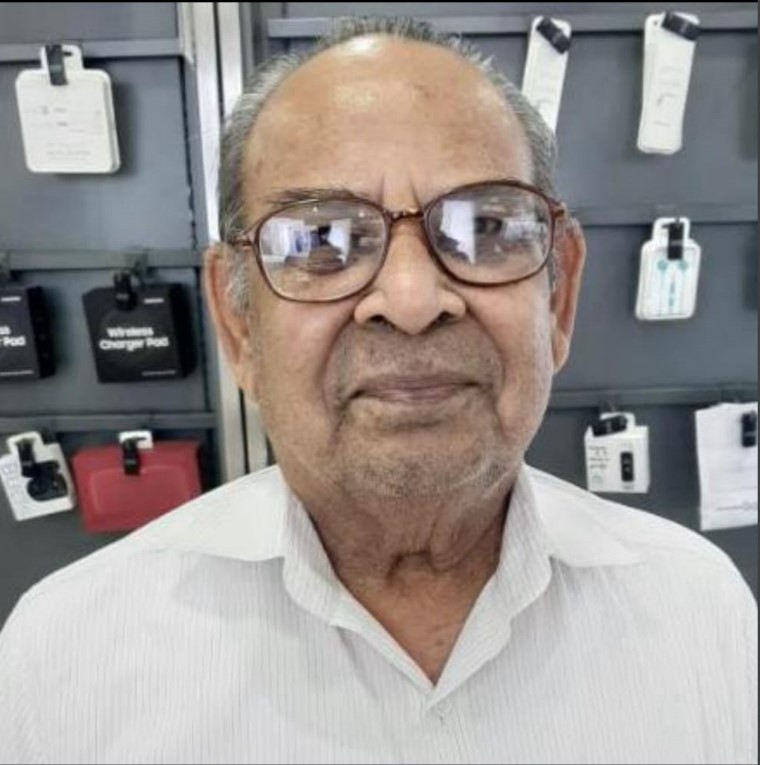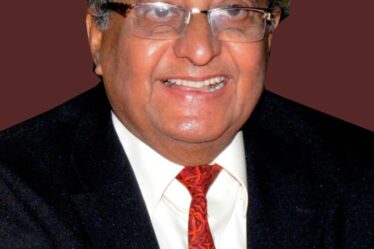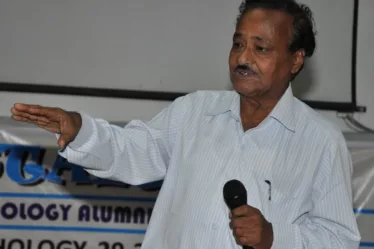
This morning, my friend Ramesh Mundle called to inform me that Dr. H.C. Attal, former Professor of Medicine at GMC Nagpur, passed away yesterday at the age of 86.
He taught us medicine during our residency at Government Medical College, Nagpur, in the late 1970s and early 1980s. He led one of the six medicine units and was known for his discipline and commitment to patient care.
Born on 18 August 1939 in Asegaon, a small village in Amravati district, Maharashtra, Dr. Harikisan Chunnilalji Attal was raised in a traditional Marwadi farming family—his father, Shri Chunnilal, worked the land, and his mother, Laxmibai, was a homemaker. His early years were shaped by rural simplicity, economic hardship, and the values of discipline and perseverance. Schooled in the vernacular medium, he faced the barriers of language and limited resources—but never let them define him. Each stage of his academic journey was hard-won: from Achalpur High School to Shivaji Science College in Amravati, and finally to GMC Nagpur in 1962. There, his brilliance quickly became evident—he earned gold medals in Surgery and Ophthalmology and later topped his MD (Medicine) examination in 1970,
He was small in stature but cast a long shadow in the wards. His bedside rounds were famously long and rigorous. Behind the thick frame of spectacles, his eyes would scan the entire ward, missing nothing, and his sharp tongue would bring to discipline even the most wayward intern, house officer, or resident. He expected detailed history and physical exam, well-reasoned differentials, and meticulous attention to patients. Many students feared his stern manner, but none questioned his sincerity.
He held Dr. B.S. Chaubey, the then head of the department, in deep reverence. Alongside him worked a striking cast—Drs. P.Y. Deshmukh, G.K. Dubey, B.G. Waghmare, S.M. Patil, Mrs. Lata Patil, and Ms. Barua—each with a distinct clinical style. In the medicine department of that era, one could sense the drama of a 1960s Bollywood film. Every physician had a role, a presence. Dr. Attal refused to be a side character. Quietly, steadily, he wrote his own script and claimed his space in the story of GMC.
Raised in an orthodox 𝘔𝘢𝘳𝘸𝘢𝘥𝘪 household, schooled in vernacular schools in small towns, and shaped by modest means, Dr. Attal rose through sheer perseverance. He knew his shortcomings—and never used them as excuses. Instead, he built his own rulebook: work hard, stay disciplined, keep moving. He understood that academic medicine was demanding, often unforgiving. Still, he endured, adapted, and earned his place as professor of medicine.
Students mimicked him. His English drew chuckles, his habits became material for mimicry, and his lines turned into running jokes in the hostel. At reunions, those tales resurfaced—polished, exaggerated, fondly retold. Yet even then, beneath the humour, lay profound respect. He was tireless: OPD in the morning, ICU by noon, postgraduate activities in the late afternoon, wards in the evening, hostel by night.
As PG hostel warden, he partnered with the ever-watchful clerk, Chimurkar. Together, they missed nothing—a noisy corridor, unpaid hostel rent, a late return—they noticed it all.
Writing a thesis under him tested patience and perseverance. He demanded clean numbers, precise charts and tables, and endless revisions. No corner-cutting. No shortcuts. Residents grumbled—for they had to re-do everything by hand—but they also grew.
Yet beneath the taskmaster lay a gentle core. He spoke softly, never raised his voice. Business families trusted him; he understood their concerns, calmed their fears, and treated them with warmth and compassion. In the hospital, he moved like a private physician—calm, composed, and attentive.
He never owned a scooter or a car. His postgraduates ferried him across campus on the pillion seat—often from the main hospital building to Wards 37 and 38, where Unit VI functioned. It became a rite of passage.
From 1966 to 1983, Dr. Attal served GMC Nagpur with unwavering dedication, rising through the ranks from Lecturer to Reader and eventually Unit In-Charge. In 1983, he was selected by the Maharashtra Public Service Commission and offered three prestigious appointments: Professor in a medical college, Civil Surgeon, and Senior Physician and Superintendent at ESIS Hospital, Nagpur. In a decision that surprised many, he chose to step away from academics and accept the post at ESIS Hospital. Yet, true to his nature, he brought the same discipline, compassion, and integrity to his new role, continuing to serve with quiet distinction until his retirement in 1997
Outside the hospital, his demeanor grew even gentler. He remained unfailingly courteous, calm, and deeply compassionate. Patients came to him not merely for a prescription, but for the comfort of his presence—the quiet attentiveness with which he listened, the clarity with which he explained in words they could understand, and the gentleness with which he held their hands to put them at ease. He never hurried through consultations, never dismissed a concern as trivial. He spoke softly, responded with empathy, and treated each patient with dignity and respect. After retiring from GMC, he continued to serve the community through his private clinic—Sanjivani Chikitsa Kendra, near the City Post Office in Itwari, Nagpur. Without advertisements or publicity, he built a loyal patient base purely through word of mouth. For many, he was not just a physician but a trusted presence—kind, steady, and deeply humane.
Patients flocked to him. He listened carefully, grasped the nuances, and offered treatments that suited the person, not just the disease.
In his final years, chronic kidney disease slowed him down. Eventually, it took him. His wife, Dr. Prabha Attal—Professor of Obstetrics and Gynecology at GMC Nagpur—stood by his side with quiet strength, both as a devoted life partner and as a respected colleague. Married in July 1972, the two shared not just a home but a deep commitment to medicine and medical education. Together, they raised three daughters—Dr. Archana (married to Dr. Hanumandas Chandak, Orthopaedician), Dr. Anju (married to Dr. Anuj Sarda, Cardiologist), and Dr. Madhuri (married to Dr. Ashish Bhattad, Anaesthesiologist)—each of whom followed in their mother’s footsteps, earning MDs in Obstetrics and Gynecology from GMC Nagpur.
Among his many friends, he shared a particularly close bond with his namesake and confidant, Dr. Harikisan Heda, a cardiologist based in Salisbury, Maryland, USA.
With Dr. Attal’s passing, we’ve lost a teacher who demanded the best—and lived by it. He will be remembered—for his peculiarities, his purpose, and his perennial presence by the patient’s side.



Very saddened to learn about sir Dr. Atal’s passing away. A remarkable teacher with a soft-spoken voice. Knowledge impeccable but delivered to his students in a funny way that registered permanently as a ‘part and parcel’ of every day’s clinical life for each pupil.
Much to his knowledge, he knew students imitated him but that further empowered him to rise above other peer professors to carve a mark of his own style of teaching on clinical rounds.
He emboldened the strong and the weak students alike to succeed.
I came to know of him as a polite gentleman perhaps more closely, while as a PG student when he took over for a couple of mos. replacing my PG guide Dr. PYD when the latter was going thru’ a transfer to Ambejogai.
Also, Dr. Atal so graciously attended my wedding in 1981 before I left for the U.S.
May Dr. Atal’s soul rest in peace.
Ironically, both of my two PG guides passed away within a span of few mos only. Sad. 🙏🏼🙏🏼
Thanks dear SP for bringing all those memories of an era of clinical medicine during our UG& PG years!
One thing I would like to share is the postgraduate activities & the clinical meetings in which he used to be very active.
All those who have worked with him must have felt sad hearing news of his passing away.
Heartfelt condolences 💐
🙏 may his soul rest in eternal peace. May the family be granted patience🙏
Bhavpurna Shradhanjali I stayed in PG Hostel for few days. Dr Attal Madam was in our Unit . GMC Nagpur Medicine Department All Postgraduate students I knew were very intelligent Dr S P Kalantri Sir Dr Baheti Dr Shriram Kane Dr Gadre and many others Very Nicely written article
He was a gentleman. A simple,down-to-earth human being who often accompanied his patients he referred to me and discussed my treatment plans. A big loss for East Nagpur.
My condolences to the family 🙏🙏
Dr Attal sir taught me Medicine in final MBBS. His lectures were like religious recital of textbook. His teaching of bedside medicine was very meticulous , helping me a lot in practice of medicine at a small town of Hinganghat with meagre investigation facilities.
Heartfelt condolences 🙏